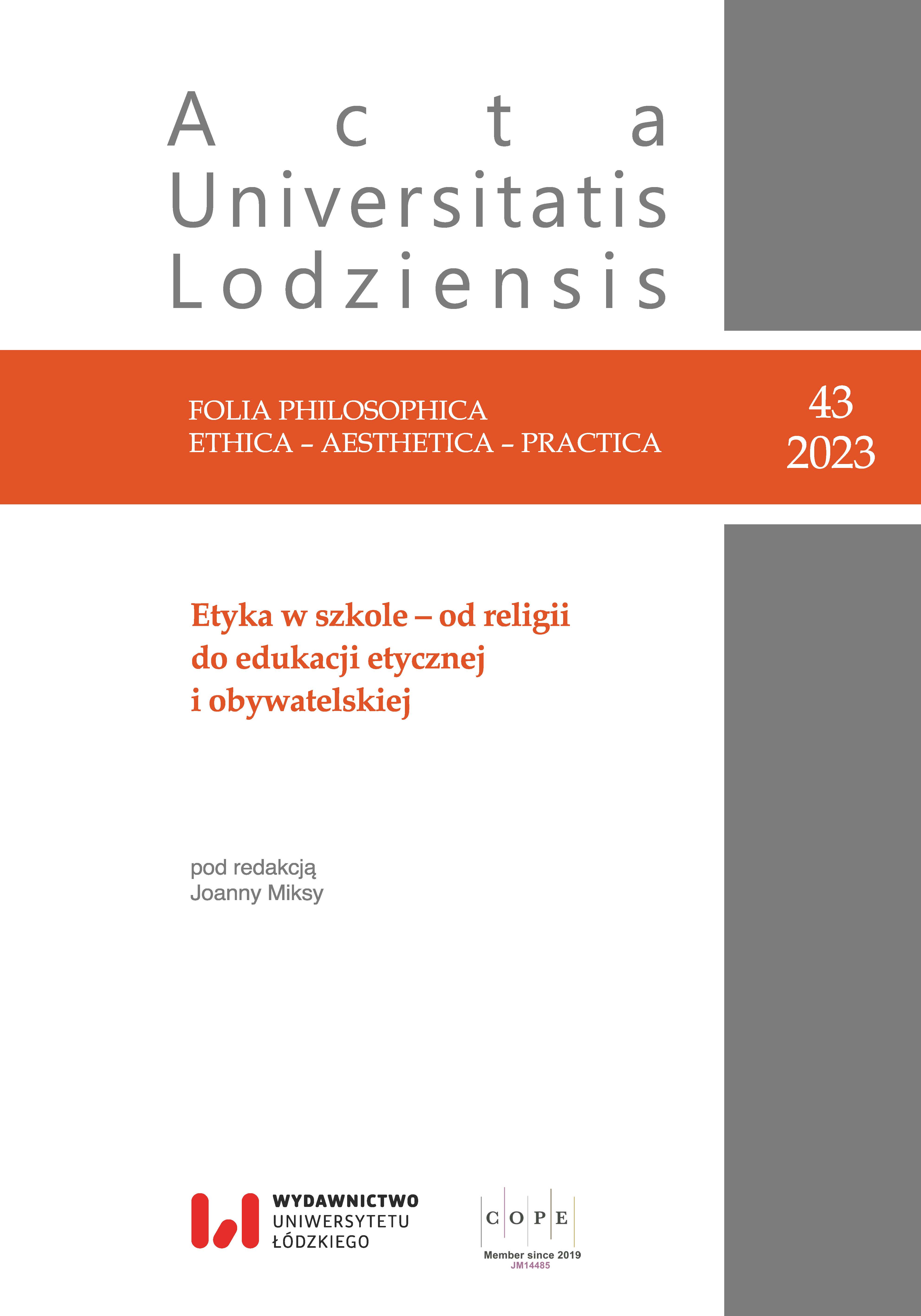Etyka wartości, edukacja moralna i nauczanie etyczne
DOI:
https://doi.org/10.18778/0208-6107.43.03Słowa kluczowe:
etyka cnót, Arystoteles, phronesisAbstrakt
Nauczanie etyki w szkole uznawane jest za ważne i potrzebne. Ale czy etyki można się nauczyć? I czy nauczanie jej powinno polegać na przekazywaniu wiedzy o koncepcjach etycznych, ewentualnie dyskusji wokół nich, czy raczej na kształtowaniu moralnych postaw uczniów i właściwych zachowań? Artykuł podejmuje namysł nad tymi problemami w nawiązaniu do różnych tradycji myśli etycznej i teorii moralności. Za główny punkt odniesienia i podstawę praktyki edukacyjnej proponuje przyjąć odnowioną współcześnie Arystotelesowską etykę cnót. Koncepcja phronesis jako rozumności praktycznej, pozwalającej tworzyć sądy moralne wrażliwe na kontekst i uwzględniające złożoność trudnych do uzgodnienia interesów i dóbr, wydaje się dla edukacji moralnej wciąż aktualnym modelem. Nauczanie i dyskusja nastawione na rozważanie konkretnych przypadków i opowieści, czyli kształcenie umiejętności tego typu osądu, pozwala uniknąć zagrożeń, jakie niesie nauka skupiona na zagadnieniach teoretycznych: uwikłania w definicyjne niejasności w określaniu wartości moralnych, czy myślenia oderwanego od emocji i od doświadczenia. Nauka polegająca na analizie filozoficznej tradycji wiąże się z ryzykiem, iż przekazywana wiedza okaże się nieadekwatna do wieku i poziomu osobistego rozwoju ucznia, generując moralny subiektywizm i relatywistyczny sceptycyzm. Argument ten nie jest jednak skierowany przeciwko teoretyzowaniu i wprowadzaniu abstrakcyjnych rozważań w procesie kształcenia, nawet na najwcześniejszych etapach: teoretyzowanie i budowanie racjonalnych uzasadnień jest potrzebne, ale powinno wynikać z inspiracji i rozwoju intelektualnych predyspozycji, a nie z przekazu gotowej wiedzy.
Bibliografia
Annas, J. (2011). Intelligent Virtue. Oxford: Oxford University Press.
Google Scholar
DOI: https://doi.org/10.1093/acprof:oso/9780199228782.001.0001
Anscombe, E. (1958). Modern moral philosophy. Philosophy, 124 (33), s. 1–16.
Google Scholar
DOI: https://doi.org/10.1017/S0031819100037943
Arystotles. (1941a). Nicomachean Ethics. W: McKeon, R. (red.), The Basic Works of Aristotle. New York: Random House, Księga 1, Część 3, s. 936.
Google Scholar
Arystotles. (1941b). Poetics. W: McKeon, R. (red.), The Basic Works of Aristotle. New York: Random House, s. 1453–1487.
Google Scholar
Arystotles. (1941c). Politics. W: McKeon, R. (red.), The Basic Works of Aristotle. New York: Random House, s. 1113–1316.
Google Scholar
Bohlin, K. (2005). Teaching Character Education through Literature. Oxon and New York: RoutledgeFalmer.
Google Scholar
DOI: https://doi.org/10.4324/9780203299838
Carr, D. (2003). Character and moral choice in the cultivation of virtue. Philosophy, 78, s. 219–232.
Google Scholar
DOI: https://doi.org/10.1017/S0031819103000251
Carr, D. (2015). The paradox of gratitude. British Journal of Educational Studies, 63 (4), s. 429–446.
Google Scholar
DOI: https://doi.org/10.1080/00071005.2015.1011077
Carr, D. i Harrison, T. (2014). Educating Character through Stories. Exeter: Imprint Academic.
Google Scholar
Dent, N. (1984). The Moral Psychology of the Virtues. Cambridge: Cambridge University Press.
Google Scholar
Driver, J. (2001). Uneasy Virtue. Cambridge: Cambridge University Press.
Google Scholar
DOI: https://doi.org/10.1017/CBO9780511498770
Foot, P. (1978). Virtues and Vices. Oxford: Blackwell.
Google Scholar
Geach, P. (1977). The Virtues. Cambridge: Cambridge University Press.
Google Scholar
Haydon, G. (2009). Reason and virtues: the paradox of R. S. Peters on moral education. Journal of Philosophy of Education, 43 (suplement do wydania 1), s. 173–188.
Google Scholar
DOI: https://doi.org/10.1111/j.1467-9752.2009.00717.x
Hursthouse, R. (1999). On Virtue Ethics. Oxford: Oxford University Press.
Google Scholar
Kant, I. (1967). The Critique of Practical Reasoning and Other Works on the Theory of Ethics. Tłum. T. K. Abbott. London: Longmans.
Google Scholar
Kohlberg, L. (1984). Essays on Moral Development, New York: Harper Row, t. 1.
Google Scholar
MacIntyre, A. (1981). After Virtue. Notre Dame: Notre Dame Press.
Google Scholar
MacIntyre, A. (1988). Whose Justice, Which Rationality? Notre Dame: Notre Dame Press.
Google Scholar
MacIntyre, A. (1992). Three Rival Versions of Moral Enquiry. Notre Dame: Notre Dame Press.
Google Scholar
McCall. C. (2009). Transforming Thinking: Philosophical Inquiry in the Primary and Secondary Classroom. London: Routledge.
Google Scholar
McDowell, J. ([1979] 1992). Virtue and reason. W: Crisp, R., Slote, M. (red.), Virtue Ethics. Oxford: Oxford University Press.
Google Scholar
Mill, J. S. (1970). Utilitarianism. W: Warnock, M. (red.), Utilitarianism. London and Glasgow: The Fontana Library.
Google Scholar
Murdoch, I. (1970). The Sovereignty of the Good. London: Routledge and Kegan Paul.
Google Scholar
Murdoch, I. ([1988] 1993). Non-relative virtues: An Aristotelian approach. W: Nussbaum, M. C., Sen, A. (red.), The Quality of Life. Oxford: Oxford University Press.
Google Scholar
Murdoch, I. (2003). Metaphysics as a Guide to Morals. London: Vintage Classics.
Google Scholar
Nussbaum, M. (1995). Aristotle on human nature and the foundations of ethics. W: Altham, J. E. J., Harrison, R. (red.), World, Mind and Ethics. Cambridge: Cambridge University Press.
Google Scholar
DOI: https://doi.org/10.1017/CBO9780511621086.007
Peters, R. S. (1981). Moral Development and Moral Education. London: George Allen and Unwin.
Google Scholar
Piaget, J. (1997). The Moral Judgement of the Child. New York: Free Press Paperbacks.
Google Scholar
Plato. (1961). Gorgias and Republic. W: Hamilton, E., Cairns, H. (red.), Plato: The Collected Dialogues. Princeton: Princeton University Press.
Google Scholar
DOI: https://doi.org/10.1515/9781400835867
Rawls, J. (1985). A Theory of Justice. Cambridge: Harvard University Press.
Google Scholar
Rousseau, J. J. (1974). Emile. London: Everyman’s Library.
Google Scholar
Sanderse, W. (2014). An Aristotelian model of moral development. Journal of Philosophy of Education, 49(3), s. 382–398.
Google Scholar
DOI: https://doi.org/10.1111/1467-9752.12109
Sherman, N. (1989). The Fabric of Character: Aristotle’s Theory of Virtue. Oxford: Oxford University Press.
Google Scholar
Sherman, N. (1997). Making a Necessity of Virtue: Aristotle and Kant on Ethics. Cambridge: Cambridge University Press.
Google Scholar
DOI: https://doi.org/10.1017/CBO9780511624865
Slote, M. (1983). Goods and virtues. Oxford: Clarendon Press.
Google Scholar
Slote, M. (1992). From Morality to Virtue. New York: Oxford University Press.
Google Scholar
Slote, M. (2010). Moral Sentimentalism. Oxford: Oxford University Press.
Google Scholar
DOI: https://doi.org/10.1093/acprof:oso/9780195391442.001.0001
Swanton, C. (2003). Virtue Ethics: A Pluralistic View. Oxford: Oxford University Press.
Google Scholar
DOI: https://doi.org/10.1093/0199253889.001.0001
Taylor, R. (2002). Virtue Ethics: An Introduction. New York: Prometheus Books.
Google Scholar
Wallace, J. (1978). Virtues and Vices. Ithaca and London: Cornell University Press.
Google Scholar
Pobrania
Opublikowane
Jak cytować
Numer
Dział
Licencja

Utwór dostępny jest na licencji Creative Commons Uznanie autorstwa – Użycie niekomercyjne – Bez utworów zależnych 4.0 Międzynarodowe.












